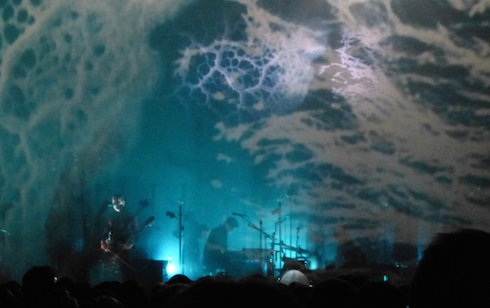 I was talking recently with a Catholic liturgical musician about the songs that people enjoy hearing at Mass, and the conflicts that take place over what's going to be played and sung on a particular Sunday. I had an embarrassing confession to make:
I was talking recently with a Catholic liturgical musician about the songs that people enjoy hearing at Mass, and the conflicts that take place over what's going to be played and sung on a particular Sunday. I had an embarrassing confession to make:
'To be honest, I don't really like any of the music I hear at Mass', I said. 'When I hear about people arguing over 'traditional' or 'modern' worship music, it sounds to me like two people with completely different aesthetics to me arguing which one they want to impose on me.'
'What sort of music would you want to hear at Mass', this person asked me.
'Post-modern rock', I said. 'I'd love to be part of a Mass where Sigur Ros is played during communion.'
I understand, of course, that there's more to liturgical music than aesthetics. I also know that my aesthetic - to say the least - isn't one that's likely to find a big following in current Catholic circles. However, the conversation made me reflect on the different functions that music plays in our spiritual life, and why one form of music might strike more of a chord (pardon the pun) with a person than another form.
The majority of the music we hear at Mass or in other Christian settings is about our relationship with Jesus and God, as an individual and as a community - whether it's praising God, asking for intercession, or expressing God's love.
It's written and composed in a way that encourages people to lend their own voices to the song. The words of the song represent our aspirations to be closer to God and our praise of God's actions in the world. It reflects a concrete identity of ourselves as people who are loved by God, and trying to live out that love in our lives.
This kind of music frames, and gives meaning to, the essential mystery of the Eucharist that we celebrate at Mass. There is, of course, nothing wrong with this style of praise and worship. But I don't think it's the only way that music can be present in the Mass.
Instead of giving voice to our faith identities, is there a way that music can instead lead us into a contemplation of the mystery of God? Instead of trying to put words around the meaning that we attribute to the celebration of the Eucharist, is there music that can lead us into silence in the face of God's unknowability? Is there a music of kenosis?
One style of music that we don't often hear at Mass these days is the Gregorian chant. One of the benefits of singing in Latin is that most of us don't understand the language, and so in participating in this sort of music we're forced to look beyond the words, to the encounter between ourselves and God that takes place beyond the words of the song. Although sometimes in English, the sort of chants that we experience in Taize prayer are similar to this.
When I listen to music from a group like Sigur Ros (who sing in Icelandic - a language that I don't speak), I'm transported into this kind of space. In addition to the incomprehensibility of the words, by stretching and playing with the forms of music to create sounds and rhythms that are new and different to my ears, this sort of music excites and opens my mind in a way that other more familiar forms of music cannot. Into this space, new ways of looking at the world - and God - can manifest.
The moment we begin to think we understand God is the moment that we've lost sight of God. Similarly, the moment we start thinking the music we have can adequately describe the infinite, indescribable mystery of God is the moment when we need to find a new musical language so we can better understand that mystery.
I don't suspect there are many church communities that will take up post-modern rock in their communion antiphons. However, I would like to see more liturgical musicians take up the challenge of creating a music of mysticism, a music that leads people into an encounter with what writer Karen Armstrong describes as the 'ineffable' or unknowable God.
And who knows - there may be many different genres that could help inform and shape that style of music.
Michael McVeigh is editor of Australian Catholics magazine and senior editor at Jesuit Communications.
Pictured: Sigur Ros.